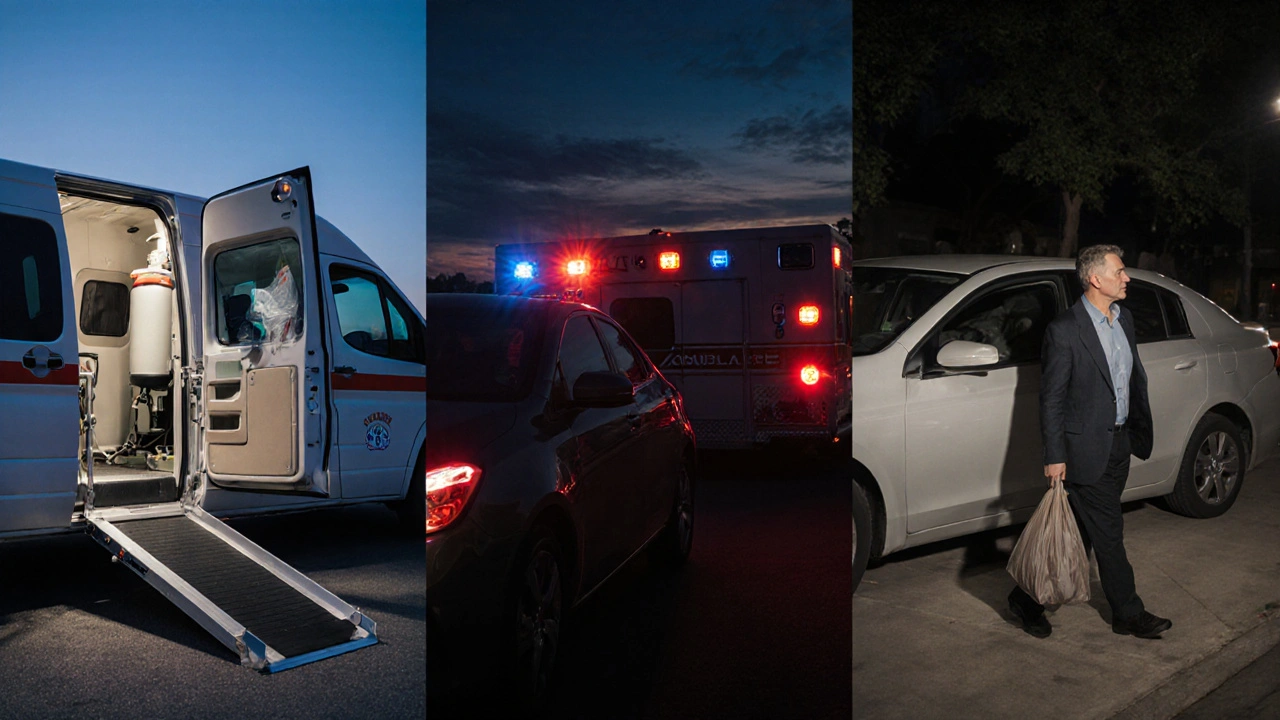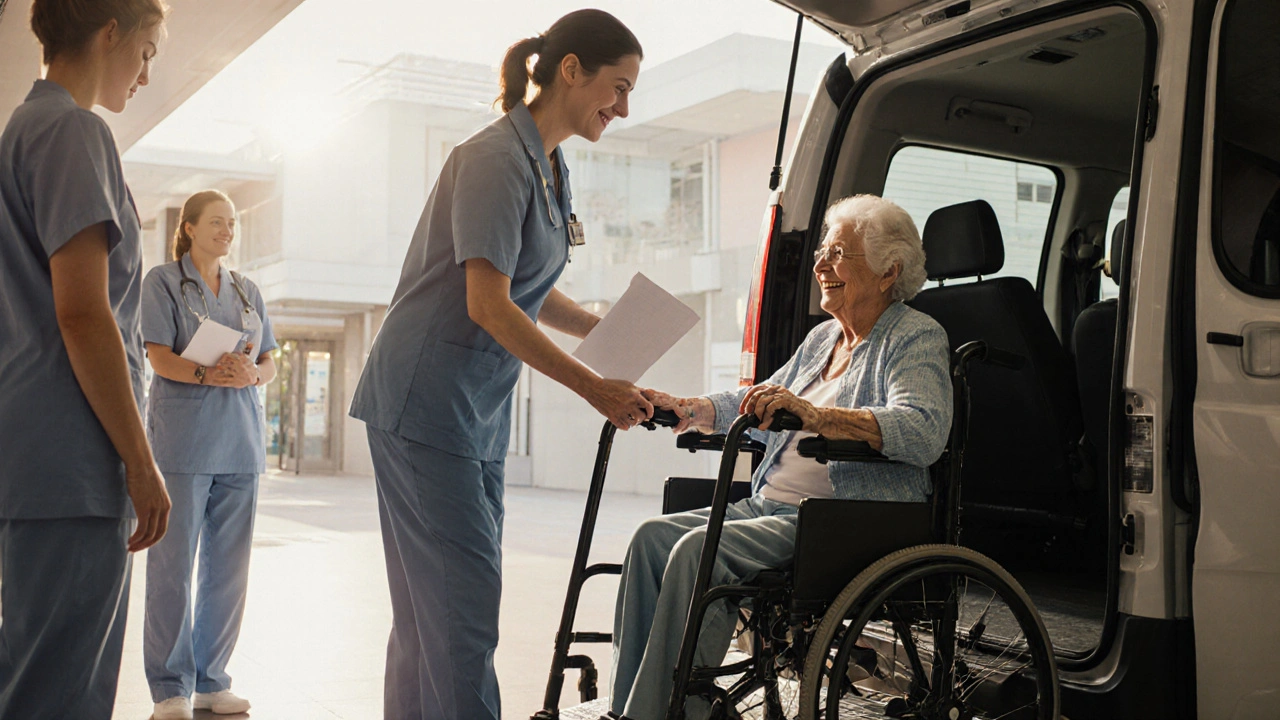Leaving the hospital should be a relief-not a stressful, confusing, or dangerous step. But for many patients, especially seniors, those recovering from surgery, or people with chronic conditions, getting home safely isn’t as simple as walking out the door. That’s where medical escort services come in. These aren’t just ride-share drivers with a clipboard. They’re trained professionals who ensure patients transition from hospital care to home with dignity, safety, and continuity.
Why Hospital Discharge Is a Risky Moment
More than 20% of Medicare patients are readmitted within 30 days of discharge. Many of those readmissions aren’t because their condition got worse-they’re because the transition home went wrong. A patient forgets their medication schedule. They can’t get up the stairs. They don’t have someone to help them eat or bathe. Or worse-they’re discharged alone, dizzy from pain meds, and end up falling on the sidewalk outside the hospital. Hospitals are under pressure to reduce stays. Discharge planning is often rushed. Nurses might hand you a stack of papers and say, “You’re all set.” But if you’re 82, just had a hip replacement, and live alone, that’s not enough. This is where medical escorts fill the gap. They don’t just drive you. They assess, assist, and advocate.What Medical Escorts Actually Do
Medical escorts aren’t paramedics. They don’t give IVs or check blood pressure. But they do far more than a taxi driver. Here’s what a typical day looks like for one:- Arrive at the hospital at the scheduled discharge time, often coordinating with nursing staff to confirm medications and care instructions.
- Help the patient get dressed, gather personal items, and move from bed to wheelchair or stretcher.
- Provide physical support during transport-holding a cane, steadying a walker, or helping someone stand without risking a fall.
- Drive the patient home in a vehicle equipped with medical-grade seating, ramps, or lifts if needed.
- Once home, assist with getting inside, finding the bedroom, and making sure the environment is safe (e.g., turning on lights, clearing clutter).
- Review the discharge plan: confirm pill times, doctor appointments, and who to call if something goes wrong.
- Stay for 15-30 minutes to ensure the patient is settled, answer questions, and alert family or caregivers if something seems off.
Who Needs a Medical Escort?
You might think medical escorts are only for the elderly. But that’s not true. Here’s who benefits most:- Patients over 65 with limited mobility or balance issues
- Those recovering from joint replacements, heart surgery, or stroke
- Patients with cognitive impairments like Alzheimer’s or Parkinson’s
- People discharged after emergency room visits without a support system
- Individuals with chronic conditions like COPD or congestive heart failure who get easily fatigued
- Patients who live alone or far from family
- Children with special needs being discharged after prolonged hospital stays

How Medical Escorts Are Different from Ambulances or Ride-Shares
It’s easy to confuse medical escorts with ambulances or Uber. But the differences matter.| Feature | Medical Escort | Ambulance | Ride-Share (Uber/Lyft) |
|---|---|---|---|
| Medical Training | CPR certified, trained in patient handling | EMT or paramedic licensed | No medical training |
| Equipment | Wheelchair lift, secure seating, oxygen support optional | Full life-support equipment | Standard car seats |
| Time at Destination | 15-45 minutes to assist with transition | Drop-off only | Drop-off only |
| Cost (Average) | $50-$150 per trip | $500-$1,500+ | $20-$60 per trip |
| Best For | Stable patients needing help with transition | Unstable patients needing emergency care | Healthy patients with full mobility and support |
How to Arrange a Medical Escort
You don’t need a doctor’s prescription to use a medical escort, but hospitals often help you set one up. Here’s how:- Ask your discharge planner or social worker. Most hospitals have a list of local medical escort providers.
- Check with your insurance. Medicare doesn’t cover non-emergency transport, but some Medicare Advantage plans do. Private insurers sometimes cover it if it’s deemed medically necessary.
- Search for accredited providers. Look for companies certified by the National Association of Medical Transport Services (NAMTS) or state health departments.
- Ask questions: Do they have trained staff? Do they carry liability insurance? Can they accommodate wheelchairs or oxygen tanks?
- Book in advance. Don’t wait until discharge day. Schedule at least 24-48 hours ahead, especially if you need a lift-equipped vehicle.

What to Look for in a Provider
Not all medical escort services are equal. Here’s what to watch for:- Staff training: Are they trained in fall prevention, dementia care, and patient communication?
- Vehicle safety: Do they have secure restraints, ramps, and clean interiors?
- Background checks: All staff should have cleared criminal and driving records.
- Communication: Can they update family members? Do they confirm arrival and departure times?
- Availability: Do they work weekends and holidays? Emergency discharges don’t wait for business hours.
Real Impact: Stories That Matter
A nurse in Ohio shared a case: a 91-year-old woman with congestive heart failure was discharged on a Friday afternoon. No family could come. The hospital arranged a medical escort. The escort noticed the patient’s oxygen tank was nearly empty and called ahead to refill it. When they got home, the escort stayed long enough to help her take her evening meds and set her alarm for the next day’s appointment. The woman didn’t return to the hospital. Another case: a veteran with PTSD was discharged after a minor surgery. He refused to go home alone. The escort, who was also a veteran, sat with him for 20 minutes, talked about his service, and made sure his VA benefits were linked to his discharge paperwork. He cried. He said, “No one’s ever done that for me.” These aren’t just rides. They’re moments of human connection that prevent crises.What Comes Next?
If you or a loved one is preparing for hospital discharge, don’t assume everything will be fine. Ask about medical escort services early. Talk to the social worker. Don’t wait until the last minute. The right support can mean the difference between recovery and readmission. Medical escort services aren’t glamorous. They don’t make headlines. But they’re one of the quietest, most effective ways to keep people safe after they leave the hospital. And for families who can’t be there? They’re the next best thing.Are medical escort services covered by Medicare?
Original Medicare (Part A and B) does not cover non-emergency medical transportation. However, some Medicare Advantage plans (Part C) include transportation benefits as an extra. Always check your plan’s benefits booklet or call your insurer. If your doctor writes a letter stating the transport is medically necessary, some plans may approve it as a covered service.
Can medical escorts help with medication management?
Medical escorts can help you get your pills out of the bag and remind you when to take them, but they cannot administer medication unless they are licensed as a nurse or certified medication aide. Their role is to ensure you have your medications, understand the schedule, and are in a safe place to take them. If you need someone to actually give you pills, you’ll need home health nursing.
How much does a medical escort cost?
Costs vary by location, distance, and vehicle type. On average, a one-way trip ranges from $50 to $150. Longer distances, specialized equipment (like oxygen or wheelchair lifts), or after-hours service may cost more. Some providers offer package deals for multiple trips. Compare prices and ask if they accept credit cards or offer payment plans.
Do medical escorts work with hospitals?
Yes. Most hospitals have partnerships with local medical escort companies and can refer you directly. Social workers often have a list of vetted providers. Some hospitals even have in-house transport teams. Ask your discharge planner for recommendations before you leave the hospital.
Can I use a medical escort for non-hospital trips?
Absolutely. Many people use medical escort services for doctor’s appointments, dialysis visits, physical therapy, or even grocery shopping if mobility is limited. These services are designed for ongoing support-not just hospital discharge. Some providers offer weekly or monthly packages for recurring needs.
